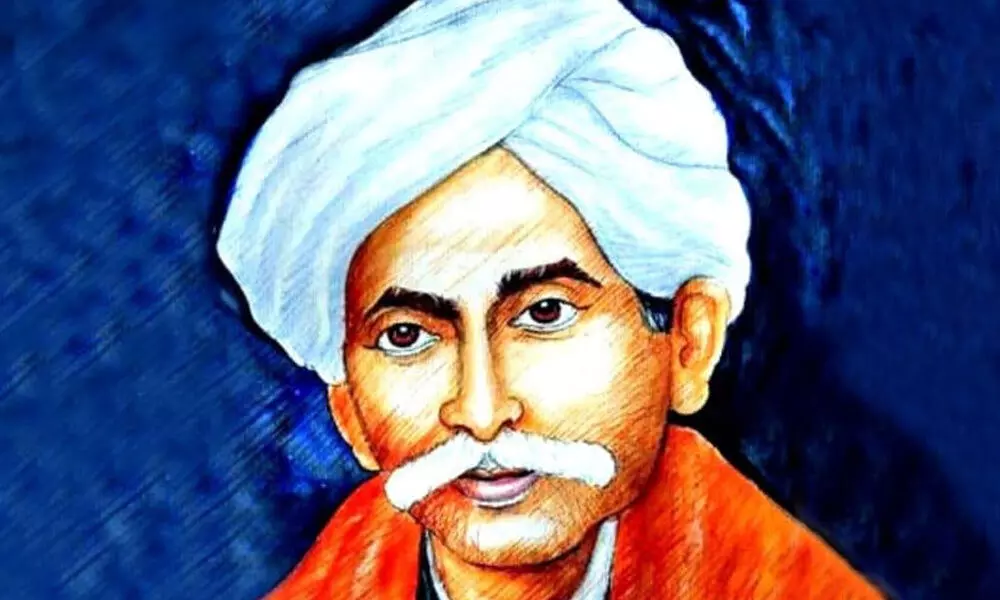Live
- Guv invites Soren to form govt
- Mahayuti allies go into huddle to pick Maha CM
- Rachakonda police issues prohibitory orders in view of TGPSC tests
- SBI rescues sr citizen from `46L cyber fraud
- 12-yr-old dies of electrocution
- Installation of smart meters opposed
- State Cabinet expansion in focus as CM leaves for Delhi
- Need to reintroduce country’s forgotten pride: Bhagwat
- Pant shatters Iyer's IPL auction record, sold to Super Giants for Rs 27 cr
- Yuva Sangeetha Sammelanam held
Just In
R emembering the unforgettable


Gurajada
How can a nation fail to remember repeatedly the unforgettable bard who sang, 110 years ago, “A country doesn’t mean mere sand and mud; but, the Nation, however, is its people with flesh and blood”? This alone is the reason why we find monographs written, rewritten, viewed, reviewed, considered, revisited and illustrated with copious notes and illuminations of the very same bard- G V Apparao (1862-1915), popularly known by his surname Gurajada
How can a nation fail to remember repeatedly the unforgettable bard who sang, 110 years ago, "A country doesn't mean mere sand and mud; but, the Nation, however, is its people with flesh and blood"? This alone is the reason why we find monographs written, rewritten, viewed, reviewed, considered, revisited and illustrated with copious notes and illuminations of the very same bard- G V Apparao (1862-1915), popularly known by his surname Gurajada.
A dramatist, poet, short story writer, epigraphist and historiographer born in the 19th century and rewrote the literary and linguistic histories of Telugu people in the 20th century, Gurajada is thus remembered in the 21st century by another polymath, Prof. Chandu Subbarao. Prof. Chandu, published 20 plus books in Telugu and English as well– some of them were anthologies of short stories, some were novellas, some make part of literary criticism, some were translations, some were writings on the Science and the Society while some were shared publications.
Prof. Chandu turned into a biographer with his recent publication, an eponymous monograph, Gurajada, Father of Modern Telugu Literature, a thumbnail picture of the literary colossus. This 86-page monograph was written with the sole purpose of conveying the endeavour and message of Gurajada to those readers who have little access to Telugu language and literature. The biographer focused on seven aspects of the giant to register the life and work of Gurajada.
Prof. Chandu presented the literary evolution of Gurajada in a plain yet interesting manner. In fact, Gurajada was initially trying his hand at writing and publishing in the "Regal Dialect" of his times, English. It was Sambhu Chandra Mukherjee (1839-94), the famed Editor of the reputed magazine "Reis and Rayyet" who republished one of Gurajada's poems –Sarangadhara- strongly recommended to the young poet to write in his mother tongue. Gurajada honouring the wise words of the wizard took to produce literature in Telugu that was Modern to the core.
Prof. Chandu observed in this monograph that Gurajada's classic of a play Kanyashulkam was staged for the first time in 1892, which was quadrupled to its original size in just five years by 1897. While propelling-in verve and vigour into every character worth its name, Gurajada was creating the foremost modern classic of Telugu language and literature, Prof. Chandu noted. And, then came Gurajada's famed poems (in fact songs), ballads and short stories one after the other he said. His write-ups and articles in different magazines stand as classics, he assumed.
What establishes Gurajada as an exceptional and exclusive literary personality was his unparalleled scholarship entwined with unmatched artistry, said Prof. Chandu. The biographer successfully established the historical significance of the yeoman service rendered by Gurajada to Modern Telugu with his minute of dissent, submitted to "The Telugu Composition Sub- committee" of Madras University.
This note of dissent, in fact, acted as the scientific basis for the only thriving linguistic reform movement, that championed the cause of spoken telugu, Prof. Chandu rightly observed. To demonstrate the unblemished usage of spoken Telugu dialect by elitists of yore, Gurajada quoted them from the 13th Century "inscriptions" that referred to "Kavibrahma Tkkana" said Prof. Chandu.
The significance of Cetti Eswara Rao's matchless enterprise in saving, editing, publishing and propagating the writings of Gurajada was extolled by the biographer in this slender monograph. The influence of Viresalingam over Gurajada and the constructive support rendered by Gidugu were properly represented in the monograph. In one word, this monograph by Prof. Chandu Subbarao is complete in itself.
{GURAJADA, Father of Modern Telugu Literature, Prof. Chanu Subbarao, Samata P ublishers, Visakhapatnam, Andhra Pradesh}

© 2024 Hyderabad Media House Limited/The Hans India. All rights reserved. Powered by hocalwire.com






